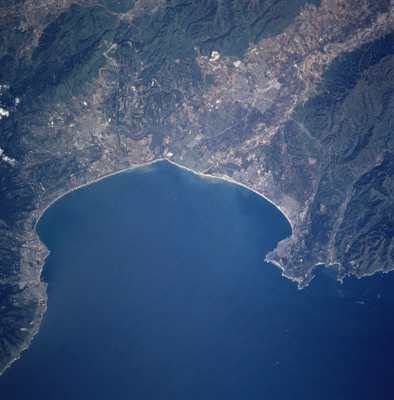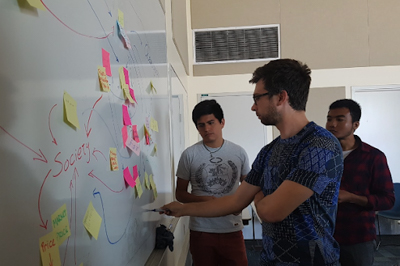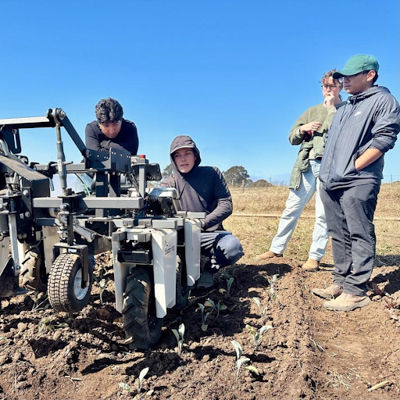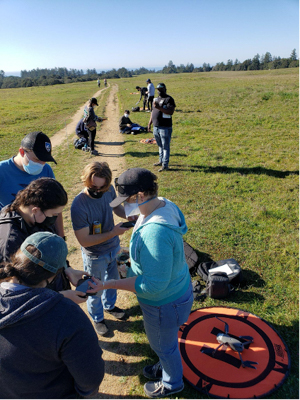Climate & Sustainability
New grant funding will help UC Santa Cruz build and diversify a climate resilience workforce for the Monterey Bay region
UC Santa Cruz will receive more than $2 million in funding to support education and training programs for undergraduates, graduate students, and working professionals as part of a larger $71.1 million federal grant to the California Marine Sanctuary Foundation and a host of local partners.

A new $71.1 million federal grant project led by to the California Marine Sanctuary Foundation will support climate resilience across the Monterey Bay region. UC Santa Cruz will partner on the project to help develop a skilled local workforce to plan, lead, and implement climate resilience actions far into the future. (Photo: Earth Science and Remote Sensing Unit, NASA Johnson Space Center)
UC Santa Cruz will receive more than $2 million in funding to support education and training programs for undergraduates, graduate students, and working professionals as part of a larger $71.1 million federal grant to the California Marine Sanctuary Foundation and a host of local partners.
The funding comes from the NOAA Climate Resilience Regional Challenge, a nationwide competitive grant program focused on collaborative projects that increase the resilience of coastal communities to extreme weather and other climate change impacts, including sea level rise and drought. The California Marine Sanctuary Foundation led a team of partners across the Monterey Bay region in applying for and winning funding through the program.
The Monterey Bay regional project team intends to focus specifically on supporting climate resilience for the low-lying, disadvantaged coastal communities threatened by sea level rise, storm surge, and flooding along the region’s four major rivers—the San Lorenzo, the Pajaro, the Salinas, and the Carmel—and by wildfire in the watersheds affecting these communities. About 30 partners will work together on the project, including city and county governments and agencies, environmental justice and community engagement organizations, Tribal liaisons, land managers, conservation organizations, ecology researchers, and academic institutions.
The group’s work will include developing a new regional network to coordinate inclusive and equitable climate adaptation planning and implementation. Some members of the team will also undertake restoration projects along local marshes, shorelines, floodplains, and dunes to help reduce flood risk. Others will work to reduce wildfire risk through fuel reduction activities, installation of shaded fuel breaks, and prescribed and cultural burning. Meanwhile, UC Santa Cruz is among the partners that will focus on another key project goal: developing a skilled local workforce to plan, lead, and implement climate resilience actions far into the future.
Coastal Science and Policy Program will oversee opportunities for graduate students and working professionals

Part of UC Santa Cruz’s subaward from the NOAA grant will go toward supporting graduate students in the Coastal Science and Policy Program, enabling them to work alongside partner organizations from the regional grant project. Students will add capacity to the partners’ work and also have invaluable experiential learning and professional development opportunities in that process. A total of 10 master’s students will receive funding over the next five years for summer placements and capstone projects that advance the goals of partner organizations related to coastal climate resilience, climate adaptation, and climate risk reduction in the Monterey Bay region.
Faculty and staff from the Coastal Science and Policy Program will also support a training program to build skills and increase capacity among local professionals working in coastal climate resilience. The program will be offered in partnership with the Elkhorn Slough National Estuarine Research Reserve’s Coastal Training Program and will run twice per year for three years, starting in 2027, serving a total of 105 participants. Fellowships designed to promote inclusion of representatives from marginalized, underrepresented, and low-income communities will cover course fees and provide a $4,000 stipend for about 20 participants.
“This grant funding strengthens and expands partnerships between the Coastal Science and Policy Program and community organizations in order to better prepare our region’s leaders and future leaders to build a sustainable future,” said Professor Anne Kapuscinski, director of the Coastal Science and Policy Program. “We are so excited for our graduate students to work alongside these partners to contribute to and enhance their work on this regional climate resilience grant. We also look forward to drawing upon our strengths in linking science and equity goals to policy and action to offer a professional training program in service to the local community.”
Center for Agroecology will expand undergraduate support programs

Meanwhile, the Center for Agroecology at UC Santa Cruz will use funding from the grant to support a new Climate Scholars program for undergraduates who are studying issues related to climate adaptation. Participants will receive a $4,000 scholarship, along with cohort-based support, and the program will also map out curricular and co-curricular opportunities related to climate adaptation across UC Santa Cruz, so that Climate Scholars can more easily plan their studies. Scholarships will be awarded to 10 students per academic year from 2025 to 2028, and students can participate in the program for up to four years.
The center will also support seven undergraduates per year in paid summer internships with partner organizations from the broader regional NOAA-funded climate resilience project. Applications for internship funding are expected to open in spring of 2025, and awards will be made for the summers of 2025 through 2028.
Center for Agroecology Executive Director Darryl Wong said the center’s team looks forward to supporting students through these programs, building on a successful model of paid and peer-engaged programming. While both projects will focus broadly on all forms of climate adaptation, Wong explained that this work ultimately ties back to the center’s mission, because, in the Monterey Bay region, issues of climate resilience and sustainable agriculture are inextricably linked.
“Agricultural production is a major industry in our region that has enormous impacts on greenhouse gas emissions, ecosystem health, and rural communities,” he said. “While those impacts can be negative, climate-smart agricultural practices, built on organic techniques pioneered in our region, can ameliorate downstream impacts and actually result in regenerative outcomes. So, rather than removing people from the land, our region is taking an approach that empowers a diverse new generation of farmers to create future economic viability through climate adaptation.”
CIDER program will host specialized drone training workshops

Funding from the new grant will also cover the costs for four undergraduate students per year to participate in an intensive two-week summer training program through the CITRIS Initiative for Drone Education and Research (CIDER), starting in 2025 and running for a four-year period.
The program will teach skills in drone safety, hardware, sensors, mission planning, flight operation, data processing, remote sensing, and standard industry programs used for agronomic research. Students will participate in hands-on instruction at the UCSC Farm and learn about environmental applications of drones, all while completing FAA Part 107 commercial drone pilot certification. Becca Fenwick, co-founder and director of CIDER, says this training will provide students with relevant, job-focused skills for supporting climate adaptation.
“Drones are a great way to collect detailed spatial data that enables more effective decision making,” she explained. “There are many applications for drones in land management, environmental monitoring, forestry, coastal change monitoring, and agriculture, so building drone skills among our future workforce could produce big benefits for regional climate resilience.”